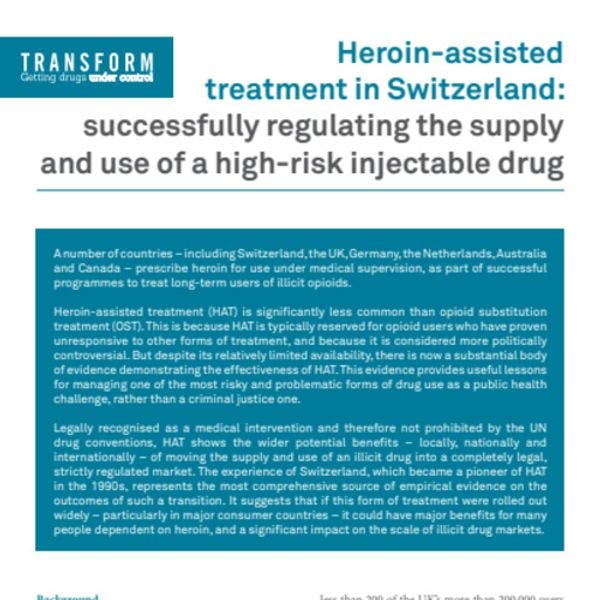Tratamiento asistido con heroína en Suiza: regulación positiva de la oferta y el uso de una droga inyectable de alto riesgo
Transform sostiene que la importante base de pruebas que demuestra la eficacia del tratamiento asistido con heroína proporciona lecciones útiles para manejar el uso de drogas como un reto para la salud pública, y sugiere los posibles beneficios que se podrían alcanzar ampliando este tipo de tratamiento.
Más información, en inglés, está disponible abajo.
Suscríbase a las Alertas mensuales del IDPC para recibir información sobre cuestiones relacionadas con políticas sobre drogas.
A number of countries – including Switzerland, the UK, Germany, the Netherlands, Australia and Canada – prescribe heroin for use under medical supervision, as part of successful programmes to treat long-term users of illicit opioids.
Heroin-assisted treatment (HAT) is significantly less common than opioid substitution treatment (OST). This is because HAT is typically reserved for opioid users who have proven unresponsive to other forms of treatment, and because it is considered more politically controversial. But despite its relatively limited availability, there is now a substantial body of evidence demonstrating the effectiveness of HAT. This evidence provides useful lessons for managing one of the most risky and problematic forms of drug use as a public health challenge, rather than a criminal justice one.
Legally recognised as a medical intervention and therefore not prohibited by the UN drug conventions, HAT shows the wider potential benefits – locally, nationally and internationally – of moving the supply and use of an illicit drug into a completely legal, strictly regulated market. The experience of Switzerland, which became a pioneer of HAT in the 1990s, represents the most comprehensive source of empirical evidence on the outcomes of such a transition. It suggests that if this form of treatment were rolled out widely – particularly in major consumer countries – it could have major benefits for many people dependent on heroin, and a significant impact on the scale of illicit drug markets.
Keep up-to-date with drug policy developments by subscribing to the IDPC Monthly Alert.
